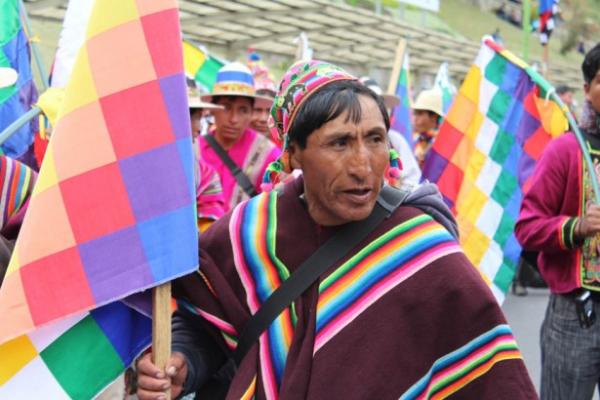
(above) "People are simply being asked to describe themselves, and there is a long history of that being fairly fluid." Credit: Sara Shahriari
Where Have All the Indigenous Gone? Bolivia Sees 20 Percent Drop
August 12, 2013 - InidanCountryTodayMediaNetwork.com
Sara Shahriari
The results of Bolivia's most recent census are raising questions due to a dramatic fall in the percentage of Bolivians who self-identify as part of an indigenous group. The growing Andean nation's 2001 census showed that 62 percent, or 3.14 million, of the population over 15 years old identified as part of an indigenous group, while according to new data that figure has fallen to roughly 40 percent, or 2.8 million.
President Evo Morales said the information "surprised" him, but stands by the results of the 2012 census, which were partially released last week.
Of course information collected through a census is subject to a huge number of variables and influences. For example, Bolivians are wondering if the way questions on indigenous identity were phrased in 2001 and 2012 caused changes, how rural to urban migration affects perceptions of identity, and if young people are now less likely to consider themselves indigenous than their parents or grandparents.
"People are simply being asked to describe themselves, and there is a long history of that being fairly fluid," says Miguel Centellas, a professor of political science at the University of Mississippi who studies Bolivia. Centellas adds that in places like El Alto, a city with a large Aymara Indian migrant population from the countryside, perceptions of ethnicity could experience rapid changes.
Now several indigenous groups, such as the Guarani of Bolivia's eastern lowlands, are speaking up. Leader Filemón Suárez said that isolated communities may not have been counted at all, according to national news outlet Radio Fides, and that this could have serious repercussions for the Guarani. "The most worrying thing is that if there are not many Guaranies the government will want to bring indigenous people from the western highlands here," Suárez told Fides, highlighting long-simmering tensions surrounding migration from the highlands to the lowlands, and fears over how rights to land and resources will be affected by the census.
Quechua Indians remained the country's largest indigenous group, followed by the Aymara, but both groups also saw their overall numbers diminished.
Detailed results of the census are yet to be released, and that information could shed light on how and in what parts of the population this change happened. Until then, it will remain a topic of debate among Bolivia's Indigenous Peoples and beyond